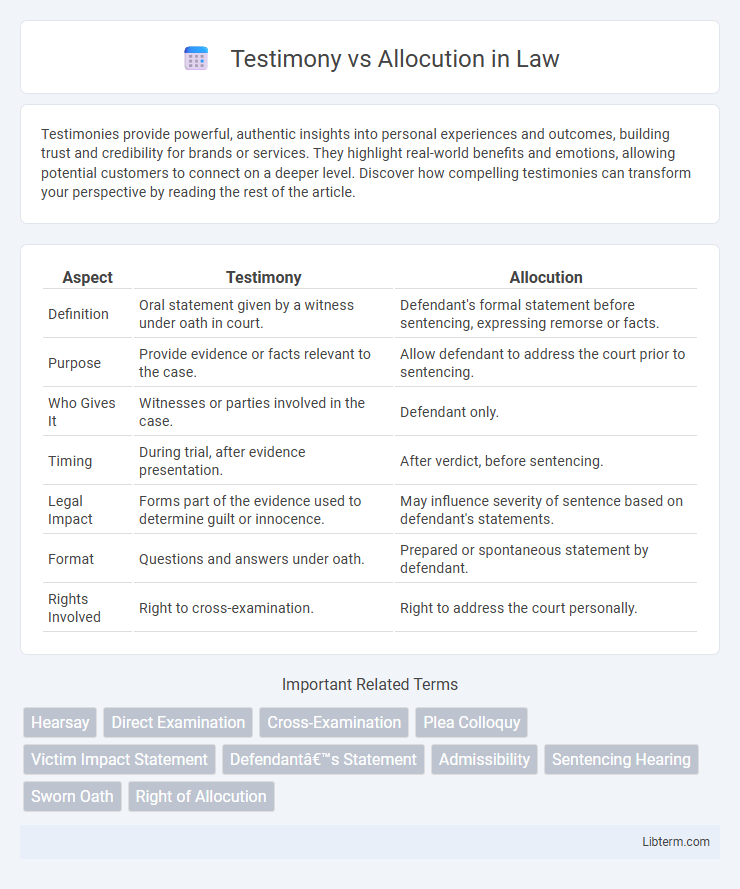Testimonies provide powerful, authentic insights into personal experiences and outcomes, building trust and credibility for brands or services. They highlight real-world benefits and emotions, allowing potential customers to connect on a deeper level. Discover how compelling testimonies can transform your perspective by reading the rest of the article.
Table of Comparison
| Aspect | Testimony | Allocution |
|---|---|---|
| Definition | Oral statement given by a witness under oath in court. | Defendant's formal statement before sentencing, expressing remorse or facts. |
| Purpose | Provide evidence or facts relevant to the case. | Allow defendant to address the court prior to sentencing. |
| Who Gives It | Witnesses or parties involved in the case. | Defendant only. |
| Timing | During trial, after evidence presentation. | After verdict, before sentencing. |
| Legal Impact | Forms part of the evidence used to determine guilt or innocence. | May influence severity of sentence based on defendant's statements. |
| Format | Questions and answers under oath. | Prepared or spontaneous statement by defendant. |
| Rights Involved | Right to cross-examination. | Right to address the court personally. |
Understanding Testimony and Allocution: Key Differences
Testimony refers to a witness's oral or written statements given under oath during a legal proceeding to provide evidence relevant to the case. Allocution is a formal statement made by a defendant before sentencing, allowing them to express remorse, explain circumstances, or present mitigating factors. Understanding the key differences between testimony and allocution is crucial for recognizing their distinct roles in the judicial process--testimony serves as evidence, while allocution is a defendant's opportunity for personal address to the court.
Legal Definitions: Testimony vs Allocution
Testimony refers to a formal statement given by a witness under oath during a legal proceeding, providing evidence relevant to the case. Allocution is the defendant's right to address the court before sentencing, allowing for a personal statement that may influence the judge's decision. While testimony involves presenting facts or observations, allocution is a procedural opportunity for the defendant to express remorse, explain circumstances, or request leniency.
The Role of Testimony in Court Proceedings
Testimony serves as a critical form of evidence in court proceedings, providing firsthand accounts from witnesses that help establish the facts of a case. Unlike allocution, which involves a defendant's statement before sentencing, testimony is presented under oath to ensure reliability and credibility. Courts heavily rely on testimonial evidence to assess the truthfulness of claims and determine the outcome of trials.
The Function of Allocution During Sentencing
Allocution serves as a defendant's opportunity to address the court directly during sentencing, allowing for personal statements that can influence the judge's decision on punishment. Unlike testimony which presents evidence during trial, allocution focuses on remorse, explanation, or mitigating circumstances impacting sentencing severity. This practice helps humanize the defendant and may result in reduced sentences or alternative penalties.
Who Can Testify and Who Can Allocute?
Only witnesses with firsthand knowledge or relevant expertise can testify in court, providing evidence under oath to establish facts in a case. Allocution is reserved exclusively for defendants, who have the right to personally address the court, expressing remorse or mitigation before sentencing. While testimony involves presenting factual information, allocution allows defendants to influence sentencing through their own statements.
Timing: When Testimony and Allocution Occur
Testimony occurs during the trial phase when witnesses provide evidence under oath to establish facts for the case. Allocution takes place after a conviction but before sentencing, allowing the defendant to speak directly to the court. This timing distinction ensures that testimony influences the verdict, while allocution impacts the sentencing decision.
Rights and Limitations: Testimony vs Allocution
Testimony involves a witness providing factual statements under oath, subject to cross-examination and the rights protected by the Fifth Amendment against self-incrimination. Allocution is the defendant's right, typically exercised at sentencing, to personally address the court, allowing for a limited opportunity to admit guilt, express remorse, or provide mitigating circumstances without the formal constraints of evidence rules. While testimony carries the risk of impeachment and legal exposure, allocution is protected from cross-examination but does not serve as evidence of the defendant's factual guilt beyond the sentencing context.
Impact on Sentencing: Testimonial Evidence vs Defendant’s Statement
Testimonial evidence during a trial provides factual details from witnesses that can significantly influence a judge's or jury's perception of the defendant's guilt, thereby impacting the sentencing phase. The defendant's allocution, a direct statement made in court, allows the defendant to express remorse or provide context, which can humanize them and potentially mitigate the severity of the sentence. Courts weigh testimonial evidence for establishing facts, while allocution offers a personal narrative that can sway judicial discretion during sentencing decisions.
Strategic Considerations for Attorneys
Attorneys must weigh the strategic implications of using testimony versus allocution during sentencing, as allocution allows defendants to personally address the court, demonstrating remorse and potentially influencing judge discretion. Testimony in trial serves to establish facts but may expose clients to cross-examination risks, while allocution focuses on humanizing the defendant and providing mitigating factors without evidentiary challenges. Selecting between these approaches depends on case specifics, the defendant's credibility, and the desired courtroom impact to optimize sentencing outcomes.
Real-World Examples: Testimony and Allocution in Practice
Testimony involves a witness providing sworn statements during a trial, such as a victim describing events to establish facts, while allocution occurs when a defendant personally addresses the court before sentencing, often to express remorse or provide mitigating context. In a criminal trial, a survivor's detailed testimony can influence the jury's verdict, whereas defendants in high-profile cases like financial fraud may use allocution to seek leniency by explaining their circumstances. These distinct courtroom practices serve different legal purposes: testimony supports fact-finding, and allocution allows defendants a voice before sentencing decisions.
Testimony Infographic

 libterm.com
libterm.com